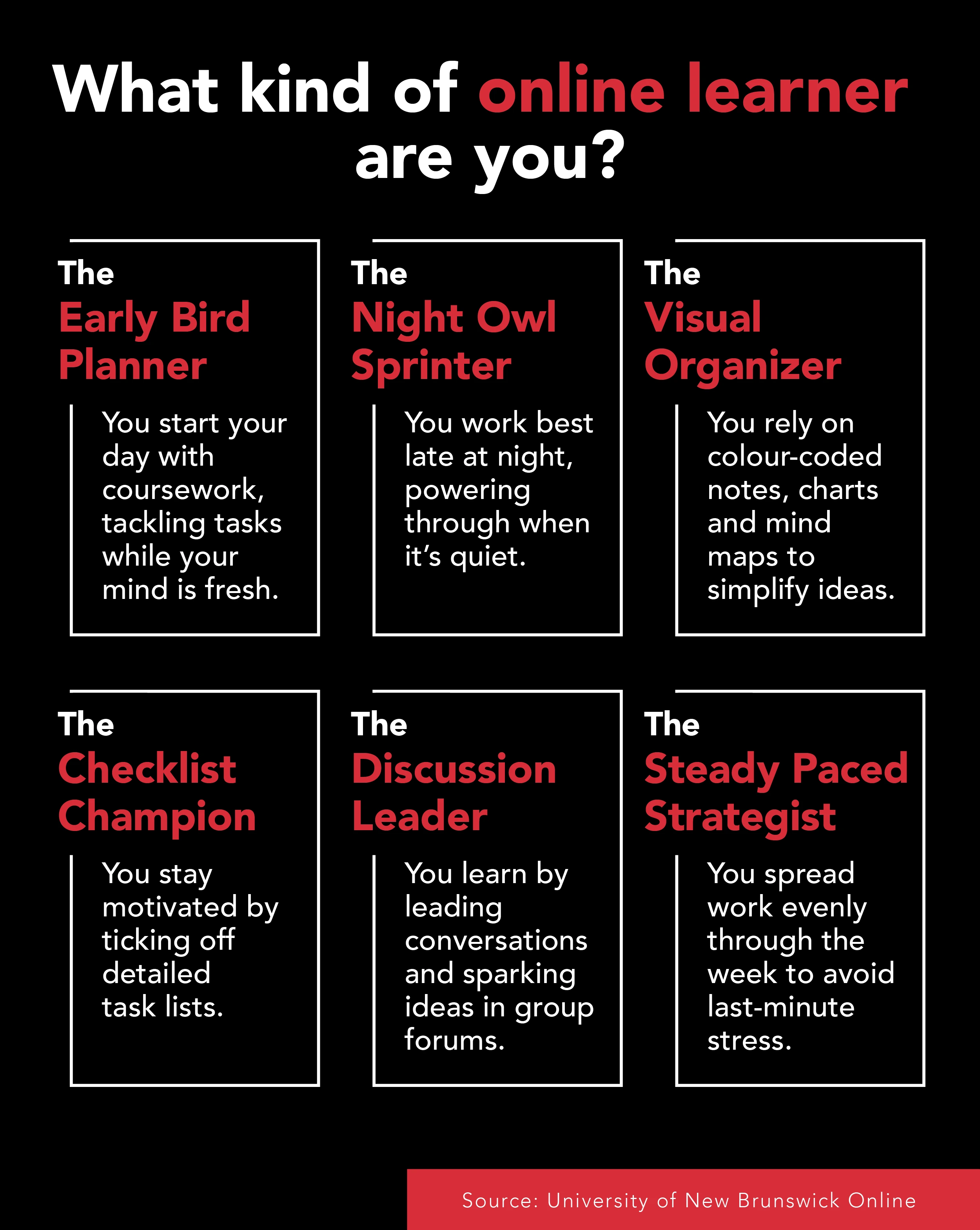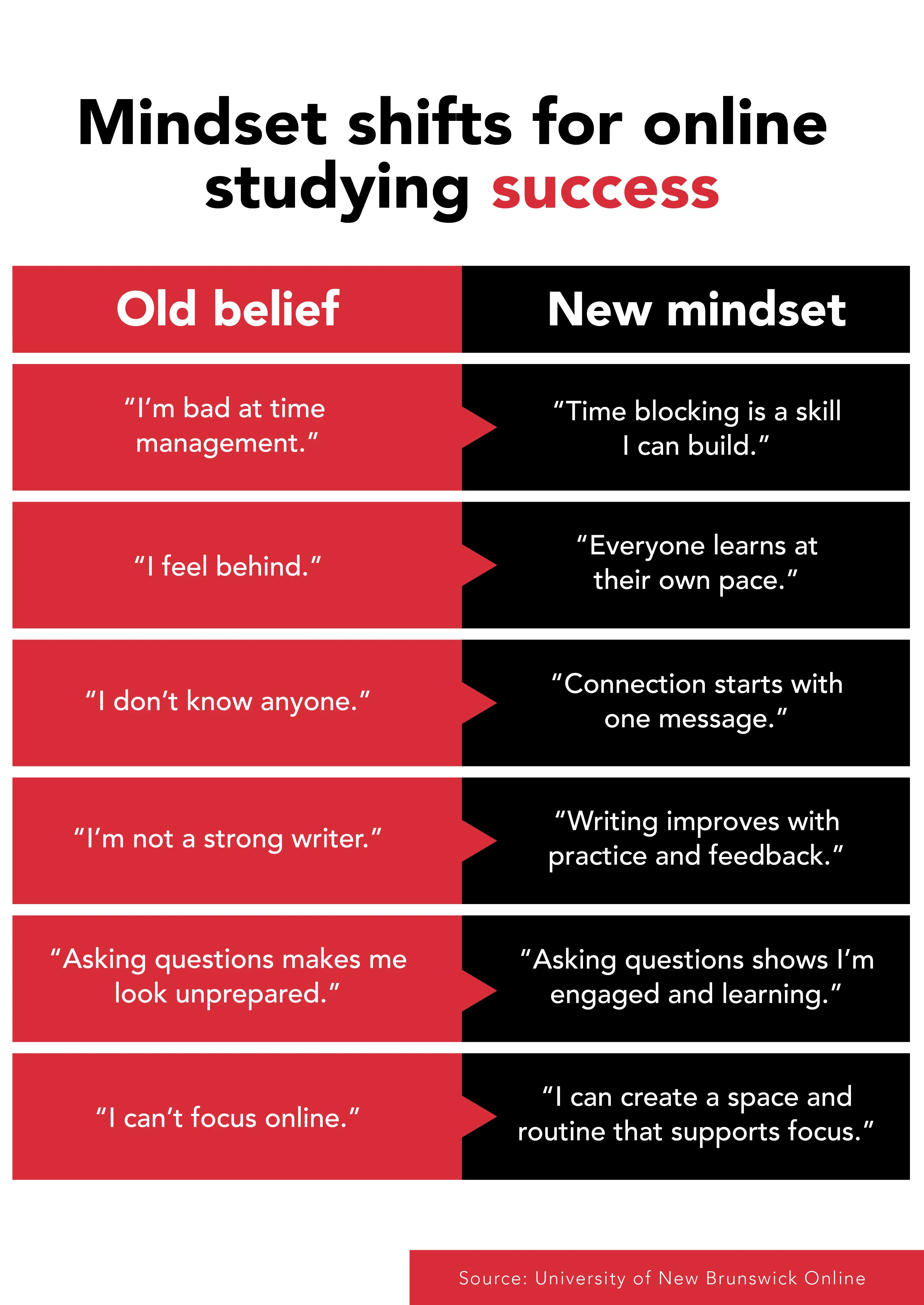The flexibility of online learning can be empowering. It allows you to study from anywhere, fit school around your work schedule and learn at your own pace.
However, this flexibility can also be challenging if you’re used to the structure of in-person classes. Without a clear plan, it’s easy to fall behind or feel disconnected.
The good news? With the right approach, you can take full advantage of your program’s flexibility while avoiding common pitfalls like procrastination, burnout or feeling isolated. The tips below will help you create a solid learning foundation and build confidence in your ability to establish a healthy work-life balance.
Tip #1: Choose a quiet area to build the foundation for online learning success
Your study space sets the tone for your learning experience. A quiet, comfortable and distraction-free spot can help you stay focused and make it easier to get into the “study mindset.” Ideally, this space should be used only for schoolwork so your brain associates it with productivity.
Here are a few ways to make your dedicated study space work for you:
- If possible, choose a spot away from household noise or high-traffic areas. Even a small corner can work if it’s yours consistently.
- Keep your study space tidy. Clutter can make it harder to focus.
- Personalize the area with good lighting, a supportive chair, a sturdy desk (or standing desk) and any materials you use often, like notebooks, pens and highlighters.
- If home distractions are unavoidable, try noise-cancelling headphones or a white noise app to block out background sound.
Tip #2: Master time management to avoid stress
One of the biggest advantages of online learning is flexibility, but without careful planning, it can lead to procrastination. Managing your time well will help you meet deadlines without the last-minute rush.
Use these strategies to build a schedule that works for you:
- Use a digital calendar like Google Calendar or Outlook to plot assignment due dates, exam periods and study sessions. Set reminders a few days in advance.
- Try time-blocking. Assign specific hours to each course, then protect that time from other commitments. Treat it the same way you would an important appointment.
- Break down big projects into manageable chunks or steps, assigning each a mini-deadline to keep progress steady.
Build in buffer days before due dates to allow for revisions or unexpected events.
- End your week by reviewing what’s coming next so nothing catches you by surprise.
Tip #3: Stay organized from day one in your online classes
Online courses often come with a large volume of files, links and assignments. Establishing a system early will help you save time later, reduce stress when deadlines approach and ensure you're set up to achieve academic success.
Here’s how to keep your coursework in order:
- Create digital folders for each course and subfolders for assignments, readings and notes.
- Use consistent file naming (e.g., “CourseName_Assignment1_Draft”) so documents are easy to find.
- Keep a master to-do list, then pull the most urgent items into a daily or weekly plan.
- Use colour coding, digitally or in a planner, to quickly spot high-priority tasks.
- Review your course syllabus weekly to make sure you’re following the program timeline and meeting expectations.

The Early Bird Planner
You start your day with coursework, tackling tasks while your mind is fresh.
The Night Owl Sprinter
You work best late at night, powering through when it’s quiet.
The Visual Organizer
You rely on colour-coded notes, charts and mind maps to simplify ideas.
The Checklist Champion
You stay motivated by ticking off detailed task lists.
The Discussion Leader
You learn by leading conversations and sparking ideas in group forums.
The Steady Paced Strategist
You spread work evenly through the week to avoid last-minute stress.
Tip #4: Use the right social media and communication tools to stay connected
Building relationships when studying remotely helps you feel less isolated and can even improve your learning outcomes. Choose tools that encourage collaboration without distracting you from your work.
These ideas can help you make meaningful connections:
- Join discussion boards early and contribute regularly. It’s easier to stay active when you’ve already built a rapport with faculty and your peers.
- If your class uses a group messaging app or forum, turn on notifications so you don’t miss important updates.
- Form a small study group with other students to review key concepts or quiz each other before exams.
- Follow your program’s official accounts for news on deadlines, webinars or networking events.
- Use social media intentionally. Log in with a purpose instead of passively scrolling.
Tip #5: Stay motivated through your distance learning journey
Motivation can fade as life gets busy, so it’s important to actively remind yourself of your goals and progress. Setting up rewards and routines can keep you engaged even during challenging weeks.
Try these approaches to maintain your momentum:
- Keep a visible list of your goals where you study, whether that’s advancing your career, switching fields or finishing your degree. Reward yourself after completing big tasks. This could be as simple as taking an evening off or enjoying your favourite movie.
- Create a pre-study routine (like making tea, putting on focus music or reviewing your to-do list) to help you shift into work mode.
- Track your progress over time. Looking back on your personal growth and what you’ve achieved can push you forward when you feel stuck.
- Stay connected with friends, family or fellow online students who encourage your studies and respect your time.

Tip #6: Explore and utilize any additional resources
Your school offers more support than just lectures and readings. Taking advantage of available resources can boost your study skills, confidence and grades.
Consider using these supports to strengthen your learning and achieve success:
- Explore your student portal thoroughly to learn where to find announcements, grade updates and course materials.
- Use library databases for reliable, peer-reviewed sources instead of relying only on internet searches.
- If your program offers writing help, book a session before a big paper is due to strengthen your arguments and formatting.
- Attend optional orientations or webinars to learn shortcuts for navigating your program’s systems. Reading educational blog posts can also be a valuable student resource!
- Schedule time with your student success advisor to talk through course load, career goals or academic challenges.
Tip #7: Make regular breaks part of your success strategy
Working nonstop might feel productive, but your brain needs rest to absorb and retain information. Scheduling short,intebtional breaks keeps your performance steady over time.
These break strategies can help you return to your studies refreshed
- Use a technique like pompodor (25 minutes work, 5 minutes rest) or try 50-minute sessions followed by a longer 10-minute break.
- Stand up, stretch or walk during breaks to refresh your energy.
- Step outside for fresh air and natural light to reduce mental fatigue.
- Keep breaks screen-free to give your eyes a rest.
- Avoid “accidental breaks”, such as scrolling through social media or answering unplanned calls, that pull you away for too long. Set a timer to keep yourself on track.
Tip #8: Get the most out of your course materials
Your course materials are more than just reading assignments; they’re tools to help you understand and apply new concepts. Learning how to use them effectively will make your study sessions more efficient.
Follow these steps to make the most of your resources:
- Preview each module before diving in so you know what to expect.
- Take notes in your own words to boost understanding and recall.
- If your program offers recorded lectures, revisit them to reinforce tricky concepts.
- Use interactive tools like self-quizzes to check your understanding before moving on.
- Ask clarifying questions early through discussion boards or by emailing your instructor.
Online learning is a skill. Build it an UNB Online
Online learning offers more than flexibility. It helps you develop discipline, focus and independence, which are valuable in any career.
If you’re still exploring your options, UNB online offers flexible, 100% online programs taught by an AACSB-accredited faculty, placing them among the top 6% of business schools worldwide. With practical course design and dedicated student success advisors, you’ll have the tools you need to succeed.
Already enrolled? Welcome aboard! We’re here to help every step of the way.

